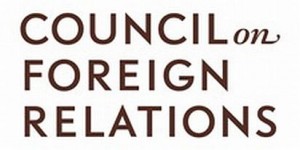CFR Convenes, Linking Leading Foreign Policy Institutes From Around the World
 The Council on Foreign Relations (CFR) has launched an international initiative to connect leading foreign policy institutes from around the world in a common conversation on issues of global governance and multilateral cooperation. The mission of the Council of Councils is to find common ground on shared threats, build support for innovative ideas, and inject remedies into the public debate and policymaking processes of member countries.
The Council on Foreign Relations (CFR) has launched an international initiative to connect leading foreign policy institutes from around the world in a common conversation on issues of global governance and multilateral cooperation. The mission of the Council of Councils is to find common ground on shared threats, build support for innovative ideas, and inject remedies into the public debate and policymaking processes of member countries.
The founding membership of the Council of Councils includes leading institutions from nineteen countries, roughly tracking the composition of the Group of Twenty (G20). The network will facilitate candid, not-for-attribution dialogue and consensus building among influential opinion leaders from established and emerging nations.
CFR will convene the inaugural Council of Councils conference on March 12-13 in Washington, DC. Participants will tackle four major themes at this first gathering:
—the overall state of global governance and multilateral cooperation
—the status of the nuclear nonproliferation regime (with a focus on Iran)
—the dollar’s future as the world’s reserve currency
—the criteria for humanitarian intervention, in the wake of regime change in Libya and the ongoing crisis in Syria
Transcripts from two on-the-record sessions of the conference, featuring President of the World Bank Robert B. Zoellick and Undersecretary of State Robert D. Hormats, will be available on CFR.org after the event.
In addition to an annual conference, the Council of Councils will provide an ongoing exchange for research and policy collaboration among its members. CFR and its international partners will experiment with new technology, using state-of-the-art videoconferencing, wikis, and mobile platforms to collectively communicate and respond to breaking crises. The group will also consider long-term structural reforms that would enhance the global governance capacity of leading international institutions.
CFR President Richard N. Haass said, “The defining foreign policy challenges of the twenty-first century are global in nature. The Council of Councils draws on the best thinking from around the world to assess emerging threats and opportunities and formulate responses to them.”
The Council of Councils initiative is funded by a generous grant from the Robina Foundation, as part of its ongoing support for CFR’s International Institutions and Global Governance program.
Founding Council of Councils Member Organizations:
Australia: Lowy Institute for International Policy
Belgium: Center for European Policy Studies (CEPS)
Brazil: Getulio Vargas Foundation (FGV)
Canada: Center for International Governance Innovation (CIGI)
China: Shanghai Institutes for International Studies (SIIS)
France: French Institute of International Relations (IFRI)
Germany: German Institute for International and Security Affairs (SWP)
Indonesia: Center for Strategic and International Studies (CSIS)
Israel: Institute for National Security Studies (INSS)
Italy: Institute of International Affairs (IAI)
Japan: Genron NPO
Mexico: Mexican Council on Foreign Relations (COMEXI)
Russia: Institute of Contemporary Development (INSOR)
Singapore: S. Rajaratnam School of International Studies (RSIS)
South Africa: South African Institute of International Affairs (SAIIA)
South Korea: East Asia Institute (EAI)
Turkey: Global Relations Forum (GIF)
United Kingdom: Chatham House (The Royal Institute of International Affairs);
International Institute for Strategic Studies (IISS)
United States: Council on Foreign Relations (CFR)
***
The Council on Foreign Relations (CFR) is an independent, nonpartisan membership organization, think tank, and publisher dedicated to being a resource for its members, government officials, business executives, journalists, educators and students, civic and religious leaders, and other interested citizens in order to help them better understand the world and the foreign policy choices facing the United States and other countries. CFR takes no institutional positions on matters of policy.
CFR’s International Institutions and Global Governance (IIGG) program aims to identify the institutional requirements for effective multilateral cooperation in the twenty-first century.
